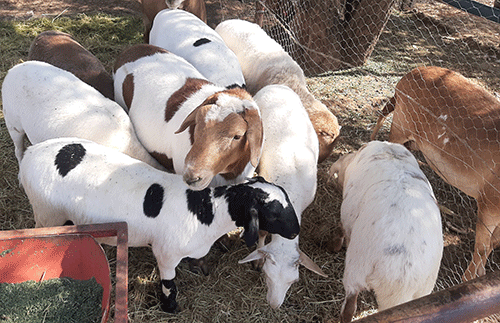OMARURU – Lionel Tjakuva, who was once employed as a mineworker, says farming is not just an income stream, but it has become a religion and lifestyle he cannot walk away from.
Tjakuva, who farms with the Meatmasters sheep in the Okamatapati area in the Otjozondjupa region, has for the last decade mastered the art of keeping and farming with these top-quality animals, which are in high demand in both Namibia and South Africa.
After leaving his high-paying job as a mine worker, he transitioned from being a part-time farmer to becoming a full-time farmer, despite the many challenges.
Today, he reaps the fruits of his labour and continues to live his childhood dream.
He said his family are generational farmers; hence, farming is in his blood, and it is the only thing he knows best.
He said it was easy for him to transition into becoming a full-time farmer.
Tjakuva now farms with Meatmasters, Boer goats as well as other breeds, but Meatmasters are his speciality. Some of his animals cost up to N$20 000.
He had to save up and buy his first animals while he was still employed.
It then became even more important for him to become a full-time farmer, based on what he had invested and the fact that he wanted to grow his portfolio.
“Farming demands perseverance, as it is a world of highs and lows,” he said while admiring his valuable Meatmasters at the recent Omaruru, Karibib and Usakos joint trade fair.
With Meatmaster and Boer goats in his care, he emphasised that farming is the backbone of all prosperity, and when you are a hands-on farmer, success will come your way.
He also encourages young farmers to take farming seriously and to expect challenges when starting, but that they should persevere.
Proper animal care, timely vaccinations and supplementation are crucial.
“It’s a rewarding business, particularly small livestock farming. For example, my first ram cost me about N$20 000, but I have already tripled my profit from its offsprings I sold to others. If you are dedicated and serious, farming can be profitable. It’s the future, and young people should embrace it without fear,” he asserted.
“Whether it’s small or large livestock, farming remains the bedrock of our economy, as it ensures you never go to bed hungry. Small livestock, especially, is profitable and sustainable, and any young farmer should start with small livestock,” he added.
Tjakuva acknowledged the challenges they face as farmers, which include theft, wild animals preying on their stock and persistent drought.
“But we persist, and I’m truly hoping that this interview with New Era will prompt our government to reach out and support us. We must not give up because farming is the way forward and the future.”


